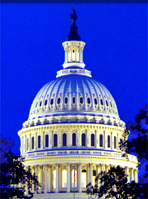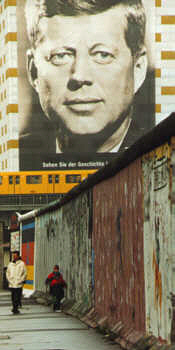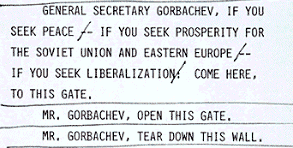|
Course
Descriptions and Syllabi
American
Politics POSC
101
Syllabus
 Do
you like Washington politics? Or are you disgusted with it? Whatever
your views, this course will introduce you to the nuts and bolts of American
politics--the things the political commentators never talk about or
discuss. Like other sections of this course, you will be provided with an
overview of the American political system, including its structure, historical
origins and operations at the national level. You will also receive, in
addition to this overview, detailed illustrations on how the rules in Washington
work and how people manipulate these rules to influence the public and the
legislature. Upon completion of this course, students will be able to
demonstrate knowledge of the historical and philosophical foundations of
American democracy, as well as an understanding of contemporary American
governmental institutions. Do
you like Washington politics? Or are you disgusted with it? Whatever
your views, this course will introduce you to the nuts and bolts of American
politics--the things the political commentators never talk about or
discuss. Like other sections of this course, you will be provided with an
overview of the American political system, including its structure, historical
origins and operations at the national level. You will also receive, in
addition to this overview, detailed illustrations on how the rules in Washington
work and how people manipulate these rules to influence the public and the
legislature. Upon completion of this course, students will be able to
demonstrate knowledge of the historical and philosophical foundations of
American democracy, as well as an understanding of contemporary American
governmental institutions.
Every week students take part in class debates
on current philosophical, social and political problems in democracy. If
you are interested in political debates, this class is for you.
Political Analysis
II
POSC 301
Syllabus
Have you ever thought that the study of political science was just one
person's opinion against someone else's opinion? This class will change your mind
about such assumptions. This course focuses on different questions about politics
using an analytical framework suitable not only for political science students, but also
science students interested in more rigorous investigations of politics. 
One set of questions involves the rationality of citizens, their political motivations
and beliefs. In this section of the course, we explore how changes in motives and
beliefs influence the behavior of citizens in democratic interest groups. Another
set of questions involves the logic of legislative organizations and the logical
foundations for manipulating policy outcomes in legislatures. In this section of the
course, we explore how changes in rules and changes in ideological beliefs of legislators
influence policy outcomes.
The material in this course is useful for students interested in pursuing a political
career in a legislature, because it involves detailed discussions of the organization and
rules governing policy votes in legislatures. The material in this course is also
useful for students interested in mass politics or grass roots organizing, since we
discuss the main factors influencing successful collective actions.
Introduction
to Democratic Political Thought
POSC 262
Syllabus
Students think that political theory is all about reading dead white guys. This
is your chance to argue against these guys and their views on democracy (in a live
setting)! It is also an integral part of a liberal education. Students find
that it gives them an edge on other students in law school by providing them with a good
foundation in democratic thinking. In this class you will have the chance to
discuss, think and write about critical issues in democracy.
Using the writings of Thomas Hobbes, John Locke, and Jean-Jacques Rousseau, you will be
asked to explore, clarify and reflect on important themes found in political theory and
political philosophy. The course is unique in that it weaves historical,
philosophical and mathematical perspectives on political theory into a coherent
perspective that yields a rich vision of contemporary democratic thought.
This perspective will provide students with an
understanding of classical contract theory, insights into the roots of modern democratic
theory that go well
beyond standard presentations of political theory.
Studies in Comparative
Politics POSC 462
Syllabus
East European Politics after Communism Berlin Wall
Berlin Wall
Are you interested in foreign affairs and democracy? This course introduces students
to political, economic and social problems facing Central and Eastern Europe since the
collapse of communism in 1989. Although we will discuss the political history of the
region, our focus will be on transitional politics and the problems associated with
changing economic and governmental institutions from totalitarian socialist economies to
capitalist democracies. As we shall see many countries have successfully introduced
democracy into their societies. Yet much work remains in Eastern Europe and
throughout the world. In 1996, only 48% of countries in the world were liberal
democratic. Another 26% were partial democracies while 26% were authoritarian
regimes. With many countries not yet democratized, understanding the problems of
transitional politics remains extremely relevant for tomorrow's policy makers.

Copy of President Reagan's speech card, June 12, 1987
Democratization
|